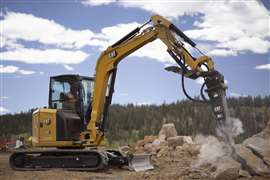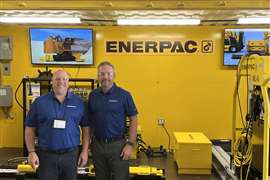VP plc's Neil Stothard talks to IRN about running a specialist rental business
11 November 2011

VP plc left the general plant hire sector in 2000 to develop specialist rental businesses in sectors including groundworks, compressed air, railways and tool hire. Murray Pollok talks to group managing director Neil Stothard about the attractions of specialising.
Don't mention procurement consultants to Neil Strothard. "They do business on the basis that everyone can do the job as well as everyone else, and we don't believe that's true. There is a danger that procurement consultants will commoditise everything, and that will drive down price and service levels."
There is a good reason why Mr Stothard, group managing director at UK rental company VP plc, resists the trend. Ten years ago, VP made the radical decision to exit the general plant hire sector and focus on developing a range of specialist rental businesses. It was a decision predicated on the poor returns and low entry barriers of general plant hire, and led VP to sell off around half of its business. That shift also resulted in the change of name from Vibroplant to VP.
The strategy has paid off, with the business generating consistent growth and good profits over the past decade. Indeed, the last two years - not good ones for the UK rental market - saw VP report operating margins of 11.7% (2010/11) and 13.9% (2009/10). Last year revenues were up 5% to £141 million.
VP's success is the result of a clear strategy to differentiate itself from the general plant sector, so you can understand his strong resistance to anything that levels out prices and service levels.
"Why do we generate better returns? There are higher barriers to entry; there is a wrapper element - we can provide added value services to customers - and it just allows you to develop your customer relationships more closely", says Mr Stothard, an Oxbridge engineering graduate who had a spell with accountants Coopers & Lybrand before joining logistics firm TDG, and then VP as group finance director in 1997, rising to group managing director in 2004.
"Ultimately, it has to be about better returns. We're capital intensive. If we're investing large sums, we're looking for above average returns."
VP focuses not just on specialist businesses (it has six, see box story) but on businesses where it can have an "influencing presence" - not necessarily market leader but certainly market leading. Thus, when it embarked on this strategy it offloaded not just the general plant operations, but also powered access, portable accommodation and power. Not because these are inherently ‘bad' or difficult businesses, but because VP was not strong enough in them.
Today, the divisions comprise Airpac Bukom (serving the oil and gas sector), Groundforce (shoring and trenching), Torrent Trackside (railways), Hire Station (tool hire), UK Forks (telehandlers) and TPA (temporary access roads).
It is barriers to entry and ‘wrapper' services that Mr Stothard constantly comes back to. The point about a specialist business, he says, is that it is expertise that is sold, and not just rental equipment.
For example, with Airpac, which rents compressed air to the offshore oil and gas exploration sector, an engineer is often supplied with the equipment. An even better example is Groundforce, a business that used to focus on basic trench boxes but now supplies highly specialised equipment such as 500 t capacity hydraulic struts, vacuum excavation machines and trenchless technology.
That division has a full-time team of more than 10 graduate engineers who turn out over 250 detailed designs every month. "It's renting equipment, but also a solution", says Mr Stothard, "We have experts talking to experts."
Even in these specialist divisions there are sub-divisions that provide further degrees of expertise. In the tool hire business, for example, the ESS Safeforce business rents and sells items like gas detectors, breathing apparatus, fall arrest and confined space training, and is the UK market leader, claims Mr Stothard.
Innovation is evident in other ways as well, such as the ‘virtual hire' or white label tool hire services it offers to around 20 UK retailers, including national DIY network Homebase and the Garden Centre Group (see box story.)
Specialising isn't the only part of the story, it's also about spreading risk. A third of revenues are generated in the infrastructure sector (roads plus ‘regulated industries' like rail, water, gas and power), another third is construction, and the balance includes oil and gas and events.
"The diversity is key", says Mr Stothard, "It creates resilience - oil and gas has a different shape and timing to GDP, and different again to regulated markets. It has worked out in practice - over the last 10 years all our divisions have performed very well, and all have had difficult years."
VP also runs a relatively lean operation. The depots are seen as logistics and maintenance centres, supported by centralised support functions, including sales centres using IT and telephone systems. These call centres were created in 1996, well before most major rental companies adopted such methods.
The divisions have shared central service departments and there is what Mr Stothard describes as very short lines of communication. "Rental only exists because customers want to respond quickly [to their customers] without making financial investments themselves - so we have to be able to respond quickly."
The depot network is also kept at a modest size, with just 100 locations overall - many shared by sister divisions - and around 70 for its national tool hire business, Hire Station, which is considerable fewer than some of its competitors.
"One of the weights around the necks of much larger companies has been the number of locations", argues Mr Stothard, "I think in some respects we've kept a relatively low number of depots, and we've been able to ride out some of the storms."
"We try to approach tool hire slightly differently", he says, "We were the first to approach it from the logistics point of view. Hire station does that very well...When you order a book from Amazon, you don't dwell on the warehouse or the driver's route. You worry that it is delivered on time and that it's the right book." Around 90% of VP's business is taken on the telephone.
The lean operation, and the smaller network, helped it weather the financial crisis better than some. "We coped better with the downturn because we went into it in better shape. We've always been conservative on growth - we're not revenue driven; it's about margins. We've always been slightly cautious. When things are buoyant, that can generate some criticism..."
VP cut back on capital expenditure and trimmed its fleets (for example, 35% of the UK Forks telehandler fleet was sold). "A lot of the equipment we've got has a very long life - Airpac, TPA, Groundforce", says Mr Stothard, "Reducing investment for a few years doesn't make much difference."
Nevertheless, capital investment is on the rise, reaching £24 million in the last financial year (to 31 March 2011) and likely to see "modest" increases this year. The telehandler fleet is back up to just 15% off the pre-recession fleet size, he says.
Of course, VP was impacted by the recession like everybody else, and Mr Stothard acknowledges that the recovery will not be without difficulties; "We see a period of overall stability, but with some challenges on the way. The construction market in 2010 was stronger than some expected. There will be some impact of public expenditure cuts, more in 2012 than 2011."
"The macro environment is still going through some challenges, but at the micro level there are still opportunities...The regulated sector will hold up better than most."
Examples of contracts in the regulated sector include Torrent Trackside's big contract with Network rail - one of the largest customers in the UK's regulated industries sector - and TPA's work with the UK's Electricity Alliance (a partnership between National Grid and 15 construction companies) to provide temporary access roads to its power lines. The latest AMP 5 water infrastructure investment plan will also help Groundforce.
Airpac is the only genuinely international business, but both Groundforce and TPA have activities in Germany and other European countries. TPA was already operating in Germany when it was acquired by VP in 2005, and Groundforce has more recently expanded into Germany, sharing one of TPA's depots in Hannover.
Groundforce isn't pushing standard trenching products in these markets. Simon Littlewood, Groundforce managing director, tells IRN that it is promoting its highly engineered hydraulic struts as a more efficient alternative to the established steel frame techniques used in Europe (and the UK). The struts, built to VP's specification, offer quicker installation times and take up less space.
To Neil Stothard, this kind of initiative is illustrative of the approach they take when moving outside the UK; "We feel that you've got to bring something new to the party - it's not a fluke that it's TPA and Groundforce that are in Europe."
With Hire Station, UK Forks and Torrent Trackside, says Mr Stothard, "we believe we have still got market share opportunities in the UK. That's not to say that we will just stay in the UK - it's driven by opportunities."
And opportunities are likely to be more in evidence in the coming years as markets recover. Neil Stothard says the lower debt level - around £40 million - means VP has the "fire power" to exploit opportunities when they arise. Just don't expect an acquisition in the general rentals sector.
BOX STORY
The VP story
VP was founded in 1954 by Fred Pilkington - grandfather of current chairman Jeremy Pilkington - although at that time it was called Vibratory Roller and Plant Hire Ltd. It later became Vibroplant and was listed on the London stock exchange in 1973.
It operated in the US for a few years - acquiring American Hi-Lift in 1982 and then selling it in 1996 - before the major shift in direction towards specialist divisions in 2000. Since then, VP has grown organically and by acquisition, and now operates the following six divisions (in order of revenues):
Hire Station (2010/11 revenues - £53.5 million)
One the national tool hire operations in the UK, it operates specialist divisions including ESS Safeforce, MEP Hire (for mechanical, electrical and plumbing tools) and Climate Hire. It also offers ‘white label' tool hire services to 20 retail companies in the UK.
Groundforce (£30.3 million)
Rents shoring, formwork, piling equipment, pumps, trenchless technology and vacuum excavation equipment. Has recently opened a depot in Hannover, Germany, and is starting to promote its hydraulic bracing struts as an alternative to conventional steel frame bracing solutions. Currently supplying struts for a northern ring road project in Stockholm, Sweden, working with contractor Bilfinger & Berger. It is VPs most profitable business, with operating profits last year of £6.7 million.
Airpac Bukom Oilfield Services (£17.5 million)
Rents compressors to the oil and gas sector, with 60% of business being well testing with major oil and gas exploration companies. It has bases in Singapore, Sharjah (UAE), Perth (Australia), Aberdeen (UK) and Curacao (Netherlands Antilles).
Torrent Trackside (£14.9 million)
Torrent rents both rail-based plant and general tools to customers in the railways sector. Its main clients are Network Rail - with whom it recently won a major contract - and London Underground.
TPA (£14.0 million)
TPA provides temporary access roads for use in construction, power generation (access to transmission lines and wind turbines) and events. It operates in the UK and Germany and from there into other European countries. Events customers include Wimbledon and major rock festivals such as T in the Park, Leeds and Reading. The company has recently added temporary pitch coverings to its range, and has supplied coverings for four of Take That's recent UK stadium concerts.
UK Forks (£10.8 million)
Telehandler rentals focused on house building and construction. Its fleet - which is mainly JCB models supplemented by Manitou, and Dieci rotos - was cut back by 35% during the recession but is now back at levels just 15% below the peak size. Returned to profit last year after a break-even performance in 2009.
BOX STORY
Argos signs up
for ‘virtual hire'
Argos is the latest big name UK retailer to sign up with VP's tool hire business, Hire Station, to provide ‘virtual hire' services to its customers. A page on tool hire has been included in Argos' latest catalogue, which is a shopping ‘institution' in the UK.
The Argos agreement means that Hire Station is providing tool hire services to 20 UK retailers at more than 1000 stores throughout the country. Hire Station does not provide equipment or staff at these stores, but offers a dedicated telephone sales line or bespoke web page for the retailers' customers to use.
Other clients include Homebase and the Garden Centre Group (formerly Wyevale Garden Centres).
The Argos partnership, like the others, is a rental share agreement, with VP taking the major portion of hire revenues. The service was first started four years ago with Wyevale Garden Centres, but the initiative moves to another level with the Argos link.
Neil Stothard plays down the significance of the agreement; "You have to be realistic about it. The Argos catalogue is very thick - what are the chances of a massive footfall? But it will be incremental. It will be interesting to see the results. It's more of an example of us doing something innovative."
The contribution to revenues from this white label strategy are still small, and Mr Stothard is not setting overly-ambitious targets; "We would be happy if it was 5% [of Hire Station revenues] - £2.5 million a year. That would be a nice target to have."



